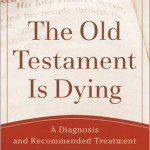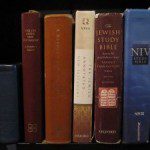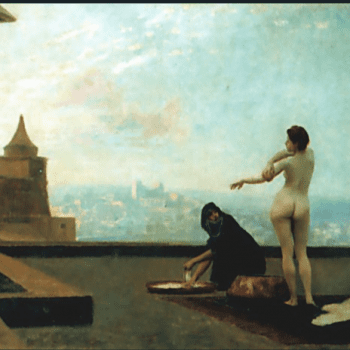A few general notes about the Book of Ether.
First, unlike the other two Book of Mormon migratory peoples, the Jaredites (as we call them) are not Jews under the Law of Moses. Abraham>Isaac>Jacob (Israel)>>>>Moses. They’re not even Israelite (also a late term) or Canaanite, but Mesopotamian. So they are operating under a different set of religious ideas, different language (Sumerian, Akkadian, something else? Hebrew isn’t an option), different cultural background than the rest of the Book of Mormon. And indeed, Ether has a different feel to it than the rest. It’s largely political history, stories of wars between scheming royal families, imprisonment, regicide, etc. All very Game of Thrones-y.
Second, Ether has often been read as directly confirming the historicity of the Bible’s accounts of both the Tower of Babel story and the Flood, the first because of Jared talking about “the tower” and language change, the second because of Ether 13:2 “after the waters had receded from off the face of this land it became a choice land above all other lands, a chosen land of the Lord.” It is assumed that this refers to the Genesis flood. There are a few problems here, which I think are illustrated in principle by a story told by Elder Oaks.
I remember the reported observation of an old lawyer. As they traveled through a pastoral setting with cows grazing on green meadows, an acquaintance said, “Look at those spotted cows.” The cautious lawyer observed carefully and conceded, “Yes, those cows are spotted, at least on this side.”
We need to take careful account of the text, and not go beyond it, leaping to conclusions. The first issue is that Ether is, I think, the most heavily edited and translated book we have. Records of some kind are kept by the Jaredites and centuries later, edited and compiled by Ether. These plates are then translated (edited?) by Mosiah. 500 years later, they are re-edited by Moroni (Eth 15:33)who makes expansive and editorializing commentary into the Book of Mormon, and then they are translated again by Joseph Smith. So although it appears we are reading an immediate first-hand eyewitness account of a tower and language change, in actuality that record passed through lots of minds and editing, who we know inserted their own comments to the record.
Another issue is that Mesopotamia had its own traditions. The Sumerian epic of Enmerkar and the Lord of Aratta describes a time when all humans spoke one language (Sumerian), but because of a conflict among deities, the language was changed. The text is fragmentary, and scholars differ about how much this dovetails with Genesis 11 which few, if any, take as historical and with good reason. Note that Ether never refers to “Babel,” only “the tower” and “great tower.” Mesopotamia certainly had towers and great towers in the form of ziggurats. Genesis shows strong Mesopotamian influence in the short Tower of Babel story, and is probably using Mesopotamian traditions to argue against and ridicule Babylon as a source of confusion, not education and high culture. As for “waters receding” this is an offhand comment by Moroni, perhaps based on something he’s read (Mesopotamians had several flood stories), but it’s not a direct witness to anything except the tradition Moroni has received.
In short, I think we need to read critically and not assume Genesis and Ether are talking about the same thing, the same way.
Outline
Ether 1-Introduction, summary, lineage.
Ether 2- Begin voyage, cross, camp, build barges. 2 Problems.
Ether 3- Bro. Prepares stones, mountain episode.
Ether 4 –Moroni is fulfilling commandments/prophecy in writing them on the plates. Testifies of their truth and a vision he had.
Ether 5-Moroni- don’t translate sealed portion and three witnesses.
Ether 6-Moroni, “and now, back to our story”. Load barges and go, 344 days (v.11) Jared gets old, picks a king.
Ether 7-The soap opera begins.Rebellion, murder, wars, prophets, etc. houses divided.
Ether 8-Continued. Akish and secret combinations. Warned against them.
Ether 9- Continues. Some kind of drought, and snakes. People repent sufficiently for God to send rain.
Ether 10-More history.
Ether 11-Starts getting bad. “Began to be wars and contentions.” Reject the prophets.
Ether 12- get to Ether and Coriantumr. Ether and faith, Moroni diverges. Faith, atonement, charity.
Ether 13- ether and the New Jerusalem. Beginning of the end. Ether prophecies to Coriantumr. No one repents.
Ether 14- curse upon the land. Coriantumr vs. Shiz. Coriantumr wounded.
Ether 15- Wakes up, remembers Ether’s prophecy. Final battle.
Notes and tidbits
2:8-11 Curse on those who don’t obey God. This would be quite prominent in Moroni’s mind, as he’d just seen it happen to his own people. He wants Gentiles to have that example in mind.
2:13-14 The Jaredites get to the beach and apparently get too comfortable. Four years later, Brother of Jared is chewed out by God for three hours for not praying during that time. Note that after the less comfortable trip across the great waters, the first thing they do when they land is pray and give thanks (Eth 6:12). What’s the connection between our life situation, prayer, and giving thanks?
2:16- Barges. Problem solving and the nature of revelation. (v. 25) What do you want me to do? Revelation (particularly here) includes a human component and God rarely just hands over answers.
“Usually we think of revelation as information. Just open the books to us, Lord, like: What was the political significance of the Louisiana Purchase or the essence of the second law of thermodynamics?…aside from the fact that you probably aren’t going to get that kind of revelation…this is too narrow a concept of revelation.”- Elder Holland.
3- See M. Catherine Thomas, “The Brother of Jared at the Veil” for some temple typology here. Link to paper, Amazon link to the book.
5:1 Moroni is writing from memory.
12:26-27 Listen in your classes. We tend to misread this as “weaknesses” plural, but the text has “weakness” singular. I suspect this is the weakness of mortality, not a divinely selected package of problems customized for each person.
15:33 People of Limhi find plates. (Mos. 8:8-9). Coriantumr among people of Zarahemla (Omni 1:21).
As always, you can help me pay my tuition here, or you can support my work through making your regular Amazon purchases through this Amazon link. You can also get updates by email whenever a post goes up (subscription box on the right). If you friend me on Facebook, please drop me a note telling me you’re a reader. I tend not to accept friend requests from people I’m not acquainted with.












